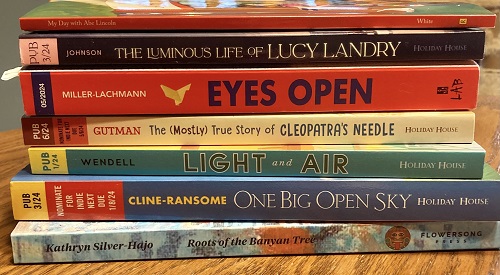A Channel for Odysseus: On Wine-Dark Seas by Tad Crawford
 BY AJ LYNDON
BY AJ LYNDON
Before writing his two novels, On Wine-Dark Seas (Skyhorse, 2023) and A Floating Life (Arcade, 2014), Tad Crawford had a successful career as a writer of business books. Although it seems a surprising change of direction, “Passion for the material is the common thread,” Crawford explains. “In the case of my business books, I was moved by a strong desire to help artists with titles such as Legal Guide for the Visual Artist. With A Floating Life I wanted to delve into the nameless narrator’s midlife crisis.”
The impetus for On Wine-Dark Seas he says, “came from a dream of my father as a Greek youth wounded in the ankle. As I carry my father down into a necropolis, he ages and becomes lighter and lighter in my arms.” Trying to understand the dream, Crawford revisited The Iliad and The Odyssey and became immersed in the larger myth of the Trojan Cycle.
The story of his novel is set after Odysseus’ return. Crawford’s interest was in a father and son long separated. When Odysseus first sees his adult son Telemachus, he enlists him as an ally in the killing of Penelope’s many suitors. There is no slow building of a relationship between the warrior forced to go to war and his son who was a babe in arms when he departed. “The issue of how the long absence—twenty years, basically Telemachus’ entire life—will be bridged and the connection made real between these two men is left for after The Odyssey,” Crawford explains. How will Odysseus, and Telemachus, be able to live on an island where they have killed the sons of so many families? Some of what the future holds is in the prophecy given to Odysseus in the Underworld by Tiresias, who foresees a gentle, seaborne death when Odysseus had reached rich old age with his countrymen at peace around him. But what will be the relationship of father and son as each moves forward with his own life?
The decision to make Telemachus (rather than Odysseus or Penelope) the protagonist was largely due to Crawford’s starting point, the dream, which was a father-son dream. “That my father was wounded in the ankle immediately brought Achilles to mind and pointed me toward The Iliad and The Odyssey. That Odysseus didn’t want to go to war but went anyway touched the impossible predicaments with which life can face us,” he says. “Think of a boy who has dreamt all his life of a father he doesn’t know. He has his own story to tell, a story he can no longer contain.” The forceful voices of Penelope and Odysseus sound clearly in the narrative when they speak of their experiences and feelings to Telemachus.

author Tad Crawford
On Wine-Dark Seas gives a portrayal of this time far different from what is offered by The Telegony, a lost epic poem which comes chronologically after that of The Odyssey, and is the final episode in the Epic Cycle. In writing his own version of events, Crawford rejects the version in The Telegony, which fails to incorporate the prophecy of Tiresias, invents sons not referred to in The Odyssey and has the son Telegonus kill his father Odysseus. On Wine-Dark Seas follows the events envisioned in Tiresias prophecy, resulting in a very different portrayal of what follows The Odyssey.
The Trojan wars continue to act as a magnet for modern novelists. Troy’s fall is covered in minimal detail in The Odyssey, Crawford says, with the endings of both The Iliad and The Odyssey leaving the reader with a sense of truncation. Other poems of the Trojan Cycle tell of the fall of Troy with the famous stratagem of the Trojan Horse. Odysseus recounts much of this to Telemachus, so the fall of Troy comes into On Wine-Dark Seas. However, to focus on the destruction of Troy would not have fulfilled Crawford’s goal to tell of an absent father whose adult son has no recollection of him when he returns from the war, he says.
On Wine-Dark Seas feels more like the epic poems it is based on rather than prose. Crawford explains that this was due to the nature of the source material that “overtook me. Often I felt I was a channel for the voices of Telemachus, Odysseus, and Penelope.” Writing the novel was a remarkable experience, he says.
With regard to future projects, Crawford does not rule out any theme. In his previous novel, A Floating Life, the narrator finds an older man who dreams of harnessing the force of water in service to humanity. That man, who runs a difficult-to-visit model boat shop, becomes a mentor, and helps the narrator find a new way forward in life. Currently he is writing a novel about another life passage—that of grief. “Perhaps the wind will fill my sails and bring me to harbour in another nautical-themed fantasy,” he says. “Then, if the winds are good, I might like to write another book about grief as portrayed in mythology (for example, Demeter and Persephone).” But Crawford’s readers will need to wait and see.
About the contributor: AJ Lyndon is based in the Victorian Central Highlands in Australia. She writes historical novels and short stories, mainly set in 17th-century England during the English Civil Wars. Her second novel, The Tawny Sash, will be published by Tretower Publishing on 30 May 2023. You can follow updates on her blog.






